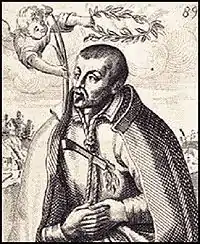| |||
|---|---|---|---|
|
Nationality words link to articles with information on the nation's poetry or literature (for instance, Irish or France).
Events
Works published

Saint Robert Southwell, S.J., executed this year; illustration from the frontispiece of Saint Peters Complaint, first published this year
Great Britain
- Anonymous, The Fissher-Mans Tale, verse paraphrase of Robert Greene's Pandosto 1588[1]
- William Alabaster, Roxana, tragædia (approximate date)
- Barnabe Barnes, A Divine Centurie of Spirituall Sonnets[1]
- Richard Barnfield, Cynthia[1]
- Nicholas Breton, Marie Magdalens Love; A Solemne Passion of the Soules Love[1]
- Thomas Campion, Poemata
- George Chapman, published anonymously, Ovids Banquet of Sence, allegorical recounting of Ovid's courtship of Corinna[1]
- Thomas Churchyard, A Musicall Consort of Heavenly Harmonie (Compounded Out of Manie Parts of Musicke) Called Churchyyards Charitie[1]
- Samuel Daniel, The First Fowre Bookes of the Civile Warres Betweene the Two Houses of Lancaster and Yorke (a fifth book later appeared without a title page or a date; see also Poeticall Essayes 1599, Works 1601 (six books), and Civile Warres 1609, the first complete edition, in eight books)[1]
- Thomas Edwards, Cephalus and Procris, Narcissus[2]
- Stephen Gosson, Pleasant Quippes for Upstart New-fangled Gentlewomen, published anonymously but ascribed to Gosson, a coarse satiric poem
- Thomas Lodge, A Fig for Momus, verse satires[1]
- Gervase Markham, The Poem of Poems, or Syon's Muse
- Thomas Morley, editor, First Book of Ballets in Five Voices[2]
- George Peele, playwright, The Old Wives' Tale (play) printed[3]
- Francis Sabie, The Fisher-mans Tale: Of the famous Actes, Life, and Loue of Cassander, a Grecian Knight
- Sir Philip Sidney, An Apology for Poetry, English criticism (written between 1580–1583; published for the first time posthumously)[4][5]
- Saint Robert Southwell:
- Edmund Spenser:
- Amoretti and Epithalamion[1]
- Colin Clouts Come Home Againe, includes "Astrophel: A pastorall elegie upon the death of Sidney", and other laments on the death of Sidney by Sir Walter Ralegh and others[1]
Other
- Luís de Camões, Rimas, Portugal
Births
Death years link to the corresponding "[year] in poetry" article:
- December 4 – Jean Chapelain (died 1674), French poet and writer
- Also:
- Thomas Carew (died 1640), English poet
- Jean Desmarets de Saint-Sorlin (died 1676), French poet and playwright
- Bihari Lal (died 1663), Hindi poet, wrote the Satasaī (Seven Hundred Verses)
- Francesco Pona (died 1655), Italian doctor, philosopher, Marinist poet and writer
- Maciej Kazimierz Sarbiewski (died 1640), Polish Jesuit and Latin-language poet
- Robert Sempill the younger (died c.1663), Scottish poet
Deaths
Birth years link to the corresponding "[year] in poetry" article:
- February 21 – Saint Robert Southwell (born c. 1561), English poet and Catholic martyr; executed as a traitor
- March 18 – Jean de Sponde (born 1557), French poet, writer, translator and humanist
- April 25 – Torquato Tasso (born 1544), Italian
- May 25 – Valens Acidalius (born 1567), German, Latin-language poet and critic
- October 15 – Faizi (born 1547), Indian poet laureate of the Emperor Akbar
- November 5 – Luis Barahona de Soto (born 1548), Spanish
- Also:
- Meurig Dafydd (born c. 1510), Welsh bard
- Thomas Edwards (born unknown), English author of two Ovid inspired epic poems Cephalus and Procris and Narcissus
See also
Notes
- 1 2 3 4 5 6 7 8 9 10 11 12 Cox, Michael, ed. (2004). The Concise Oxford Chronology of English Literature. Oxford University Press. ISBN 0-19-860634-6.
- 1 2 Lucie-Smith, Edward, Penguin Book of Elizabethan Verse, 1965, Harmondsworth, Middlesex, United Kingdom: Penguin Books.
- ↑ Fowler, Alastair (1991). A History of English Literature. Cambridge, MA: Harvard University Press. p. 71. ISBN 0-674-39664-2.
- ↑ Preminger, Alex; Brogan, T. V. F.; et al. (1993). The New Princeton Encyclopedia of Poetry and Poetics. New York: MJF Books/Fine Communications.
- ↑ Craig, D. H. (1986). "A Hybrid Growth: Sidney's Theory of Poetry in An Apology for Poetry." In Kinney, Arthur F., ed. Essential Articles for the Study of Sir Philip Sidney. Hamden: Archon Books.
This article is issued from Wikipedia. The text is licensed under Creative Commons - Attribution - Sharealike. Additional terms may apply for the media files.